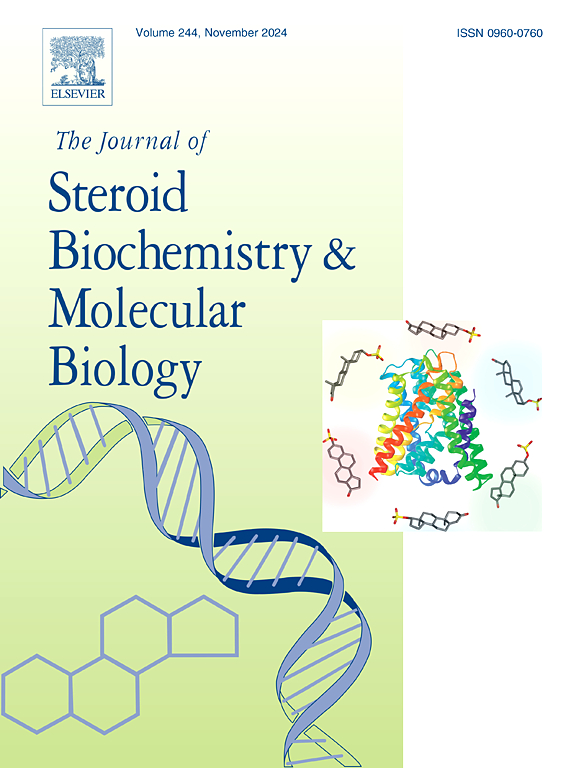异孕酮在多囊卵巢综合征精神合并症发病机制中的作用。
IF 2.7
2区 生物学
Q3 BIOCHEMISTRY & MOLECULAR BIOLOGY
Journal of Steroid Biochemistry and Molecular Biology
Pub Date : 2025-03-08
DOI:10.1016/j.jsbmb.2025.106719
引用次数: 0
摘要
背景:多囊卵巢综合征(PCOS)是一种影响10-15%育龄妇女的内分泌紊乱,对身心健康都有重大影响。最近的几项研究调查了多囊卵巢综合征和精神疾病之间的联系;然而,将两者联系起来的机制尚不完全清楚。异孕酮是一种调节GABAA受体的神经类固醇,自然受到多囊卵巢综合征病理生理的影响。它被认为在情绪障碍中发挥作用,包括经前焦虑症和产后抑郁症。近年来,异孕酮类药物与多囊卵巢综合征之间的关系已成为研究热点。证据获取:使用PubMed、MEDLINE和Cochrane Library等数据库进行文献综述。关键词包括“多囊卵巢综合征”、“精神疾病”、“异孕酮”和“神经类固醇”。文章是根据多囊卵巢综合征的精神病学意义选择的,重点是高质量的原创研究。使用推荐、评估、开发和评估等级(GRADE)手册标准对资源进行质量评估。证据综合:文献综述显示,越来越多的证据表明多囊卵巢综合征与精神疾病风险增加之间存在密切联系,特别是抑郁、焦虑和情绪障碍。异孕酮(一种神经类固醇)的作用被认为是这种关系中的一个重要因素,一些研究表明其对多囊卵巢综合征患者情绪调节的潜在影响。结论:临床医生在诊断和治疗多囊卵巢综合征时,迫切需要考虑其对心理健康的影响。在多囊卵巢综合征的管理中整合精神病学筛查可以导致早期发现和改善预后。未来的研究应侧重于异孕酮和其他神经类固醇治疗多囊卵巢综合征相关精神疾病的治疗潜力。本文章由计算机程序翻译,如有差异,请以英文原文为准。
Allopregnanolone in the pathogenesis of the psychiatric comorbidities of polycystic ovarian syndrome
Polycystic ovarian syndrome (PCOS) is an endocrine disorder affecting 10–15 % of women of reproductive age, with significant implications for both physical and mental health. Several recent research studies have examined the connection between PCOS and psychiatric disorders; however, the mechanism linking the two is not fully understood. Allopregnanolone is a neurosteroid that modulates GABAA receptors and is naturally affected by the pathophysiology of PCOS. It is thought to play a role in mood disorders, including premenstrual dysphoric disorder and postpartum depression. Recent research has begun to focus on the relationship between PCOS and allopregnanolone. A literature review was conducted using databases, including PubMed, MEDLINE, and Cochrane Library. Keywords included “PCOS,” “psychiatric disorders,” “allopregnanolone,” and “neurosteroids.” Articles were selected based on relevance to psychiatric implications of PCOS, with a focus on high-quality, original research studies. Quality assessment of the sources was informed using the Grades of Recommendation, Assessment, Development, and Evaluation (GRADE) Handbook criteria. The literature review revealed a growing body of evidence suggesting a strong association between PCOS and an increased risk of psychiatric disorders, particularly depression, anxiety, and mood disorders. The role of allopregnanolone, a neurosteroid, was identified as an important factor in this relationship, with some studies indicating its potential impact on mood regulation in PCOS patients. There is a dire need for clinicians to consider the mental health implications of PCOS during diagnosis and management. The integration of psychiatric screening in PCOS management could lead to earlier detection and improved outcomes. Future research should focus on the therapeutic potential of allopregnanolone and other neurosteroids in treating psychiatric disorders associated with PCOS.
求助全文
通过发布文献求助,成功后即可免费获取论文全文。
去求助
来源期刊
CiteScore
8.60
自引率
2.40%
发文量
113
审稿时长
46 days
期刊介绍:
The Journal of Steroid Biochemistry and Molecular Biology is devoted to new experimental and theoretical developments in areas related to steroids including vitamin D, lipids and their metabolomics. The Journal publishes a variety of contributions, including original articles, general and focused reviews, and rapid communications (brief articles of particular interest and clear novelty). Selected cutting-edge topics will be addressed in Special Issues managed by Guest Editors. Special Issues will contain both commissioned reviews and original research papers to provide comprehensive coverage of specific topics, and all submissions will undergo rigorous peer-review prior to publication.

 求助内容:
求助内容: 应助结果提醒方式:
应助结果提醒方式:


